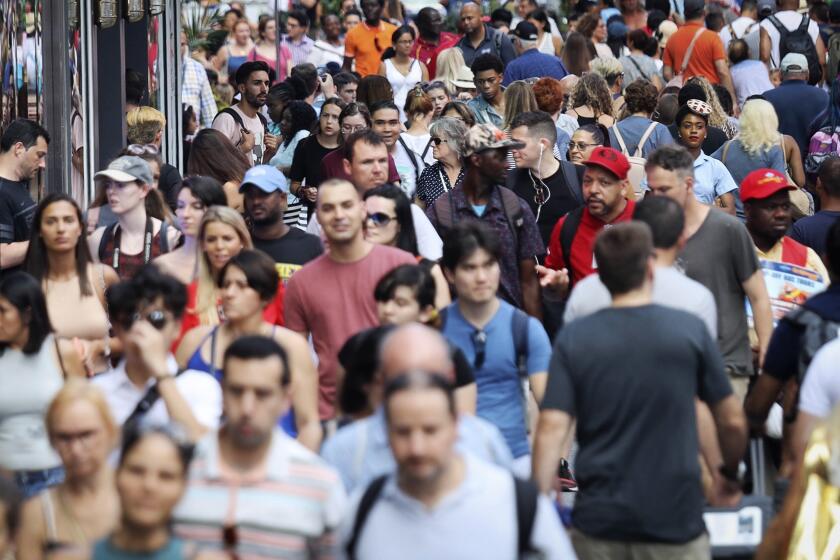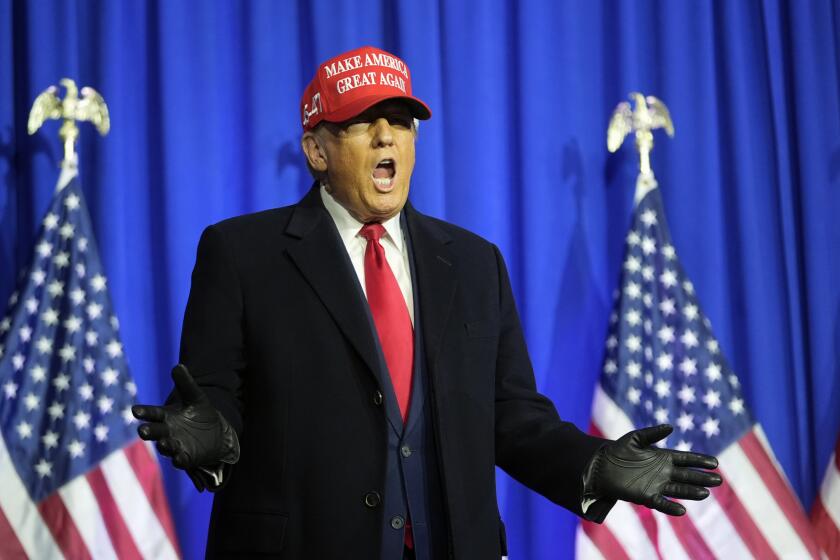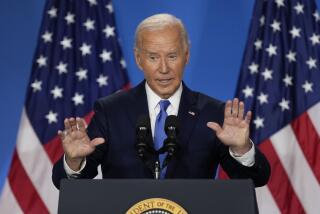Column: Joe Biden’s empathy was his superpower in 2020. Can he find it again in 2024?
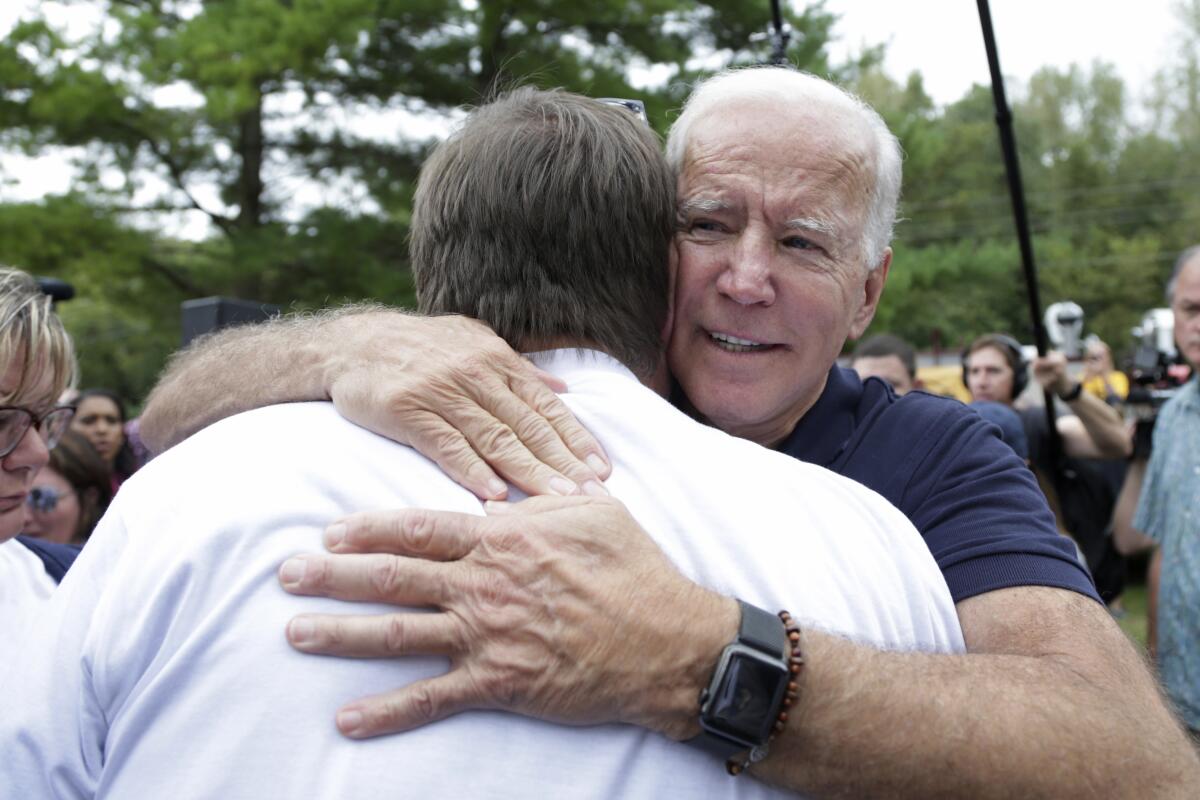
- Share via
WASHINGTON — Whatever happened to the empathetic Joe Biden who won the 2020 presidential election?
Some days it feels as if that kindly Uncle Joe has been replaced by a cranky old pol annoyed at voters who don’t give him credit for a strong economy.
Last week, when the Labor Department reported that inflation had ticked up to 3.5%, probably delaying a cut in interest rates, Biden didn’t offer much solace.
“We have dramatically reduced inflation from 9%,” he said. “We’re better situated than we were when we took office.” That’s true, but it’s cold comfort to consumers and home buyers.
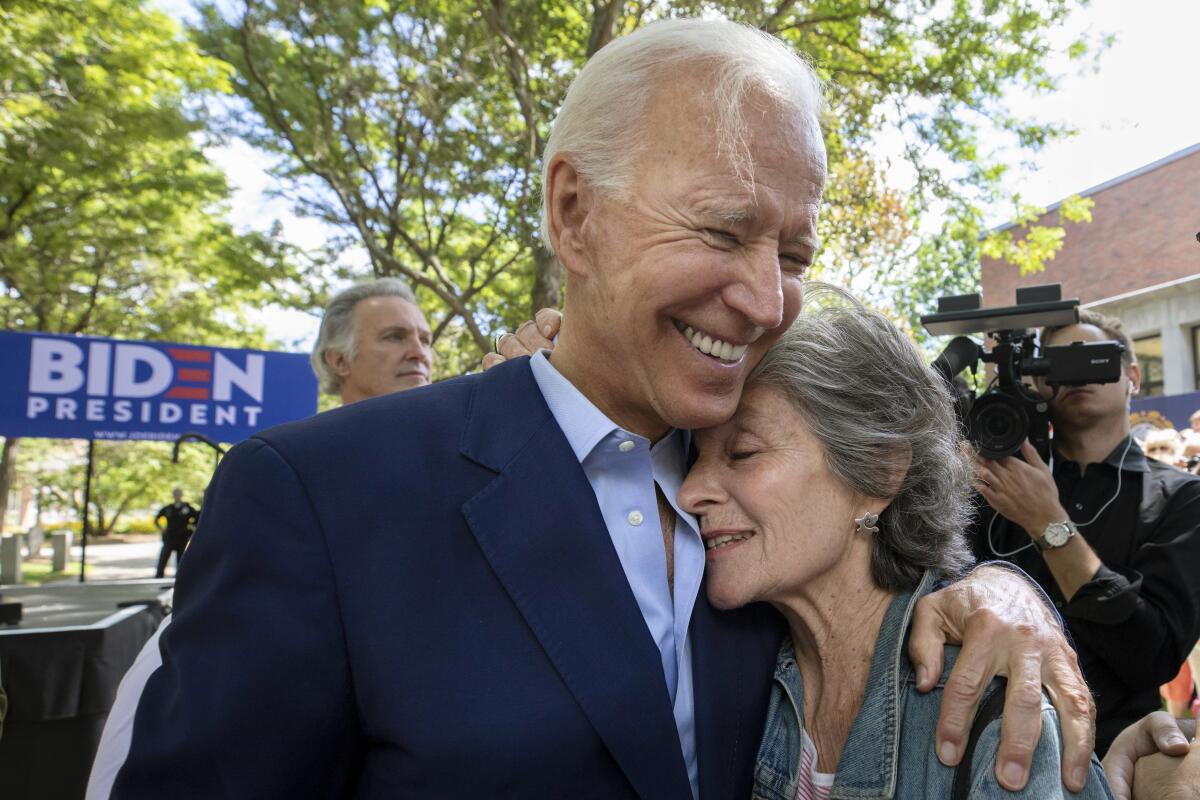
A week earlier, when a reporter asked Biden what he would tell Americans stressed by high prices, the president replied: “I’d say we have the best economy in the world. We have got to make it better.”
It’s a theme he’s been sounding for months. In his State of the Union address, he extolled the U.S. economy as “the envy of the world.”
Even as the country has become more racially and ethnically diverse and religious attendance has declined, the relative size of the two big political-party coalitions has stayed almost identical.
But a chorus of Democratic strategists say it’s the wrong message, mainly because it’s missing the element that was once Biden’s political superpower: empathy.
“You can’t tell people they’re better off than they think they are,” said Mark Mellman, a veteran political consultant. “It’s important to acknowledge their pain. Otherwise it comes across as a signal that you don’t understand their lives.”
“I wouldn’t go out there and extol the miracle of the Biden economy,” said David Axelrod, who helped Barack Obama win two presidential elections.
Biden isn’t running only against Trump. An anti-vax Kennedy and other third-party candidates could draw enough Democratic defectors to swing the election.
“The right strategy is to say, ‘Look, we’ve made a lot of progress … [but] the way people experience this economy is the way I did when I was growing up in Scranton, Pennsylvania,’” Axelrod said in an interview with conservative pundit Bill Kristol. “‘How much did you pay for the groceries? How do you afford the gas, the rent? These continue to be a problem and I’m fighting that fight.’”
“The message needs to start with empathy and focus on prices, which is the issue that matters most to voters,” said Stanley Greenberg, who helped Bill Clinton win the presidency in 1992. Otherwise, he said, “people just get angrier and angrier.”
During the 2020 campaign, when Americans were reeling from the human and economic costs of the COVID-19 pandemic, Biden spoke often of his personal history — his upbringing in a family of modest means, the death of his first wife and baby daughter in a 1972 highway crash, the 2015 death of his son Beau — and his feeling of kinship with others who suffered losses.
Biden’s campaign wasn’t shy about drawing attention to the contrast with then-President Trump, who seemed more intent on dismissing the pandemic’s impact. “Empathy is on the ballot,” Jill Biden, soon to be first lady, said on Twitter. But those empathetic moments seem to have become less frequent since Biden became president.
Former President Trump is bashing California in his 2024 campaign; if he wins he wants to force it to change — on environment, immigration, LGBTQ issues and more.
Trump’s California-born advisor says he would deploy troops to blue states to seize undocumented immigrants, send them to camps, then expel them.
Biden does acknowledge that the economy still has problems, but not nearly as often as he stresses that his policies are succeeding.
“We have more to do. I get it,” he said in Arizona last month. “But no question, our plan of delivering for the American people is working right now.”
It’s also true that the economy has been improving over the last two years, with strong growth, job creation and — in recent months — wage increases. When Biden took office in 2021, the economy had begun to recover from the pandemic, but unemployment was still over 6%. Since then, more than 15 million jobs have been created and the unemployment rate has stayed below 4% for more than two years.
But Biden has reaped little political benefit from those positive trends, mostly because inflation, which peaked at 9% in 2022, has led to persistently high prices and mortgage rates.
In dealing with the economy, President Biden faces all-too-real consequences of higher inflation, and he’s also battling human psychology.
Voters are in a sour mood. An Economist/YouGov poll released last week found that 67% of Americans believe the country is “on the wrong track” and 39% believe the economy is in a recession. (It isn’t.) Only 20% say they believe the economy will improve if Biden is reelected. Twice as many, 44%, said they believe the economy will get better if Trump wins.
The president still gets some credit for empathy, but less than before. In 2020, the Quinnipiac poll reported that 61% of voters said they believed Biden “cares about the average American”; this year, the same poll found that number had declined to 51%. (Trump trailed at 42% on the topic in both 2020 and this year.)
Inflation is a frustrating problem for any president. There’s little he can do to reduce grocery or gas prices. A president isn’t supposed to put pressure on the Federal Reserve to cut interest rates and probably wouldn’t succeed if he tried.
Tariffs on foreign goods aren’t paid by other countries; they’re paid by American consumers — and they often fail to protect jobs.
So Biden has tried to show voters that he’s doing the best he can, working to push prices down in areas where the federal government does have sway. One of his favorite talking points is his sponsorship of the 2022 law that allows Medicare to negotiate drug prices and capped the monthly cost of insulin at $35; Biden says he’ll try to expand the law’s reach if he’s reelected.
But the critical strategists say there’s more he can do, especially if he can reactivate his superpower.
“I think he can win with a message that starts with empathy, saying ‘I know high prices are killing people,’ and goes on to talk about higher taxes for billionaires and corporations,” Greenberg said. “Let Joe be Joe.”
“Bottom line: Be more like Joe from Scranton and less like President Biden from Washington,” Axelrod said.
Biden aides say, sometimes in unprintable language, that they don’t need so much free advice. Politico reported last year that the president called Axelrod “a prick.”
And yet, they might be listening.
This week, Biden is launching a three-day “economy tour” of Pennsylvania, and he’ll begin by talking about taxes. His first stop: Scranton.
More to Read
Get the L.A. Times Politics newsletter
Deeply reported insights into legislation, politics and policy from Sacramento, Washington and beyond. In your inbox three times per week.
You may occasionally receive promotional content from the Los Angeles Times.
